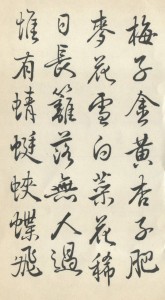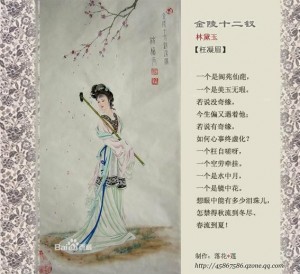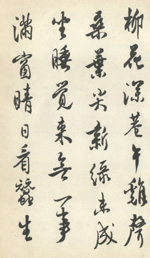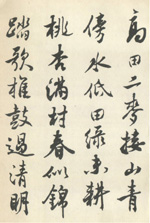Song of the Red Bean* Cao Xueqin (1715 — 1763/1724 — 1764)
Translated by YK Chan (December 2009); revised June 2013

HongDou CI
睡不稳纱窗风雨黄昏后,忘不了新愁与旧愁。
咽不下玉粒金波噎满喉,照不尽菱花镜里形容瘦。
展不开的眉头,捱不明的更漏。
呀!恰便似遮不住的青山隐隐,流不断的绿水悠悠。
My bleeding heart and tears of desperation drip endlessly like red beans dropping;
Yet, forever blooming spring willows and flowers are in full view at this picturesque dwelling.
Tossing and turning after dusk for that storm strikes at the lace-screen window,
I forget not at all recent and past sorrow.
Swallowing not delicious rice and fine wine, they choke down my throat;
Looking into infinity the ornate mirror reflects only my meagerness and despair.
My frown can’t be unlocked; I endure the long dark night not.
Ah! It’s just like a green mountain that’s only vaguely veiled in fog,
Or a meandering emerald stream that can’t be block’d!
——————————
*The ‘red bean’, 红豆 hongdou, here really is the jequirity bean, which is produced by the leguminous jequirity plant (Abrus precatorius, cf. http://en.wikipedia.org/wiki/Abrus_precatorius) and used often in Chinese poetry as a love token—相思豆 xiangsi dou, the love bean, e.g. 王维 (701-761) Wang Wei’s poem 相思 Xiangsi.
Xiangsi 相思 denotes a special yearning for a loved one, from whom the lover is separated. Cao’s 红豆詞 HongDou Ci (Song of the Red Bean) is from his famed Dream of Red Mansions. It was written as a poem for the protagonist, 贾宝玉 Jia Baoyu, to sing after he was separated from his lover, 林黛玉 Lin Daiyu. It appears in Chapter 28 of this classic novel.
Music composed by Liu XueAn 刘雪庵 (1905-1985)
Guzheng solo:
http://m.youtube.com/watch?v=NuRGlo2_L-4
José Carreras (tenor) performance:
http://m.youtube.com/watch?v=ZSs1ciW_lUA&feature=related
 《四时田园杂兴》__范成大 (1226-1193)
《四时田园杂兴》__范成大 (1226-1193)


